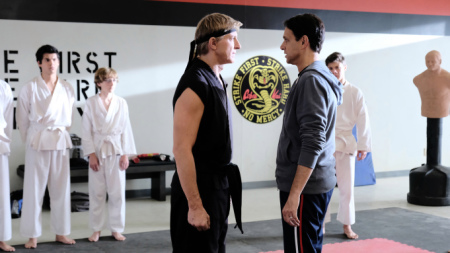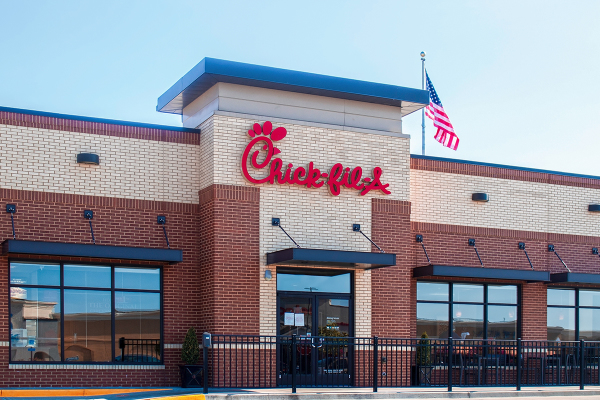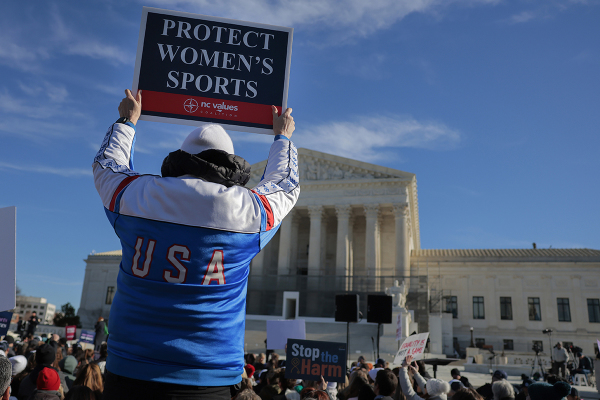5 Reasons Christians should watch Netflix's Cobra Kai

There is a debate of no trivial consequence raging in my Friday morning men’s Bible study. Some of us contend that Netflix’s hit show Cobra Kai is a beacon of light shining through the woke fog of modern TV. It is a breath of fresh air and a poignant commentary on today’s uber-progressive social zeitgeist. Others think it’s just another helping of hack-acted, teeny-bopper trash TV with no redeeming value; it is mindless drivel served up for the binge-watching zombie masses. I’m never one to make war where peace is possible, but in this case my brothers are so absurdly wrong I have no choice but to engage the fight. As Martin Luther famously said, “here I stand, I can do no other.”
By way of primer, Cobra Kai is a popular Netflix series that follows the lives of the characters from the original 1984 movie, Karate Kid. The characters are played by all the same cast members as the original. Ralph Macchio is Daniel LaRusso, William Zabka is Johnny Lawrence, and so on. The show picks up their stories thirty-five years after Daniel defeated Johnny with the infamous Crane Technique kick-to-the-face to win the 1984 All Valley Under-18 Karate Tournament. Life has gone well for Daniel, not so much for Johnny.
I don’t know anything about show creators Jon Hurwitz, Hayden Schlossberg and Josh Heald’s religious beliefs. They may be practicing Jews, professing Christians, atheists, agnostics or Zoroastrians. What I do know is over the course of two seasons they deliver nine-and-a-half hours of the most profound, refreshing and insightful social commentary I’ve ever seen. It is an epic take down of modern PC culture, and it is delicious.
Don’t misunderstand me, Cobra Kai is not a “Christian show,” nor does it pretend to be. In fact, I am certain many of my Christian brothers and sisters would be put off by its cavalier approach to sexual ethics and its occasionally salty language. That said, it walks where most modern shows fear to tread, and in so doing, it highlights some basic biblical truths our woke culture has forgotten. For that it should be celebrated. Here are five things Cobra Kai gets right (SPOILER ALERT):
1) It highlights the importance of fathers
The theme of absentee fathers permeates nearly every episode of Cobra Kai. The show does a great job of highlighting the importance of having fathers present and active in their kids' lives. More than that, it shows how, in the absence of a good father figure, kids will attach themselves to virtually anyone willing to show them attention, sometimes with devastating consequences. We all know this intuitively and research bears it out. Kids raised without a father suffer from abandonment and attachment issues, have lower rates of economic success later in life, suffer higher rates of child abuse and are more likely to end up in a gang or incarcerated. Cobra Kai drives these points home with a five-finger face punch.
Storylines about fatherless kids struggling to make it are hardly original in Hollywood. What sets Cobra Kai apart is that it not only addresses the problem, it offers a sound solution. And it does not come from a progressive government program, political slogan or neo-feminist single supermom. It comes from real men who recognize their own shortcomings but realize the welfare of the children in their charge takes precedence over their own fears and selfish desires. It says, “this is what a real man does.” He steps up, takes responsibility and teaches kids how to become adults. It is a refreshing take on traditional fatherhood from an industry whose stock-in-trade is to depict fathers, when they are present at all, as bumbling dolts who serve no higher value than being the source of their wife’s exacerbation and the brunt of their kids jokes.
2) It shows that not all masculinity is toxic
Cobra Kai openly and affirmatively rejects modern culture’s “toxic masculinity” narrative. It does not take the popular position that masculinity is bad, rather it offers a deliberate and intelligent dissection of different types of masculinity. Some masculinity is toxic, no doubt. It is self-serving and merciless, and it leaves a path of devastation in its wake. That type of masculinity is the legacy of Johnny Lawrence’s evil sensei, John Kreese, and it’s what Johnny must overcome if he wants to be a better man. Johnny is tough, he likes to kick ass, and he’s drawn to Kreese’s “strike first, strike hard, no mercy” philosophy. But he recognizes how damaging it is and that he must let it go.
Enter the refreshing courage of Cobra Kai’s creators. They could have easily resolved Johnny’s toxic masculinity dilemma by having him disavow all things manly and embrace a more woke “the future is female” philosophy, but they didn’t. They didn’t make Johnny go soft, they still let him kick ass, but they taught him some lessons.
They made him contend head on with the damaging fallout of his Kreesean masculinity and learn to temper it with honor. They let Johnny be humbled by his earlier mistakes so he could see them for what they were, the misguided rage of a broken youth. Johnny faced his past and learned from it not by being weak, but by being strong. Johnny learned that being a man isn’t about dominance, it is about strength. He doesn’t need to give up his strength and his masculinity to be a good man, he just needs to rule it rather than letting it rule him. It’s a long journey for Johnny, but that’s how life works. As viewers we’re not even sure he fully gets it by the end of season two, but he’s well on his way. And as he becomes a better man, he becomes a better teacher, better father and better friend. Nothing toxic about that.
3) It illustrates our need for redemption
One secret that Christians learn very early in our faith is the healing power of Christ’s redemptive love. Living with the consequences of our brokenness and sin is dark, debilitating and crushing. The human spirit needs redemption. It lifts us up and gives us hope. This is true in a Biblical sense, but it is true in a practical sense as well. We need healing or the darkness will destroy us.
I don’t want to overstate things here, and I want to be clear: neither the lessons of Cobra Kai, nor the tenants of Eastern Mysticism touched on in the series offer redemptive salvation. They do not. But our God is wise and generous, and he spreads his grace fully over all his creation. That is why we can see sparks of the divine all around us. It’s why each of us is an image bearer of the Almighty, and why we can learn about the character of God by observing his creation. Our innate need to be redeemed to those we have wronged is an imperfect reflection of our need to be fully and perfectly redeemed in Christ. That need for human redemption is on full display in Cobra Kai, and it plays out wonderfully with all the beauty and tragedy of human relationships.
Both Daniel LaRusso and Johnny Lawrence need redemption. They need it for the damage they’ve done to themselves, their families and each other, and for the damage they continue to do. Even more poignant is neither one realizes they need it until it may be too late (we’ll have to wait for season three to see if they figure it out). They both think the other one is to blame, and they are trapped in their own sin and darkness to ever worsening results. Only we, the audience as neutral observers, can see the devastating fallout of these two fallen men’s need for redemption. Cobra Kai is not preaching the gospel in its story line, but Gospel truth is on full display.
4) It demonstrates the danger of false idols
At their core, idols are about identity. Our idols are those things we wrap ourselves up in to define our persona. They tell us who we are. They make us feel secure and gives us a sense of value. Our idols are the most important things in our life, and they define everything about us. It’s a good bet that’s why God addresses them in the very first commandment. Pick the right idol, God, and you will receive life everlasting. Pick the wrong one, anything else, and this world will always disappoint you.
Nowhere in popular entertainment is that truth on fuller display than in the character of Eli Moskowitz in Cobra Kai. Eli is a hurt and broken kid who gets picked on and bullied. He wants a new identity more than anything. He’s searching for an idol. He finds it in Cobra Kai’s version of “no mercy” karate, and it transforms him into a devil. The young actor who plays Eli, Jacob Bertrand, delivers an Emmy-worthy performance in turning the achingly shy Moskowitz into the merciless, loud-mouthed Karate bully “Hawk.” It is a case study in the devastating effects of choosing the wrong idol. Eli trades genuine friendship, camaraderie and acceptance for hollow fame in the persona of Hawk, and it goes predictably horribly.
By the end of season two Hawk has lost everything: his girlfriend, his best friend and his human decency. But rather than see the error of his ways, Hawk is so consumed by his idol he doubles down. He goes all in on the path to self-destruction as people following false idols are wont to do. It is tragic and predictable. But mostly it’s a terrific reminder of the need to choose one’s idols wisely.
5) It calls out the absurdity of woke culture
Cobra Kai is, among other things, a fish out of water story. When Johnny Lawrence wakes up in a beer-induced haze at the beginning of episode one it’s almost like he arrived in a time machine. He is a product of the 80’s and he just doesn’t understand the world around him. Framing the character that way was a stroke of pure genius. It has a “get off my lawn” vibe on steroids that is the perfect vehicle for pointing out the absurdity of much of today’s cultural moment.
Our current culture tells us men and women are the same, maybe even interchangeable, Johnny thinks that’s absurd (he’s right). Culture tells us our kids can’t be pushed too hard because if they fail it will hurt their self-esteem; Johnny tells them to stop being a bunch of sissies (he uses a more vulgar term). Culture tells us you can find meaningful relationships on an app; Johnny prefers bumping into girls at the bar to start a conversation. He even has a formula “not too hard, but kind of hard so they notice.” Culture tells us we should hate the patriarchy; Johnny hates the Patriots too. Culture says we should drive eco-friendly hybrids; Johnny rolls in a custom Dodge Challenger with a 6.4L V8. And the list goes on.
I admit watching Johnny Lawrence tear Gen Z woke culture to shreds is a selfish indulgence, but hey, this is a TV show after all. Plus, just because his criticisms are insensitive and ham-fisted doesn’t make them wrong. In fact, it’s what makes them exactly right.
6) Bonus: It celebrates Iron Eagle
Johnny Lawrence is an unabashed fan of the tragically under-appreciated 80’s movie Iron Eagle (and Iron Eagle 2). I share his affinity for the adventures of Doug Masters and Chappy Sinclair and hats off to the Cobra Kai show runners for finally giving that franchise its due.
Cobra Kai is not a Christian show, but it a show Christians should appreciate. We live in a world where traditional values and morals are under unrelenting assault. Those values grew out of the Christian worldview of our ancestors. Every attack on them is a direct assault on core tenants of our Christian ethics, and it’s getting worse every day. When a show comes along that dares to stand up against the barrage it should be supported and celebrated by Christians. It takes guts to make a show like Cobra Kai, and guts is what our side needs right now.
By day Jay Atkins works as a Government Affairs attorney for a California-based technology company. By night he is a lay author and Christian apologist. He thinks and writes about proofs for faith and how they intersect, or should intersect, with public policy.





















